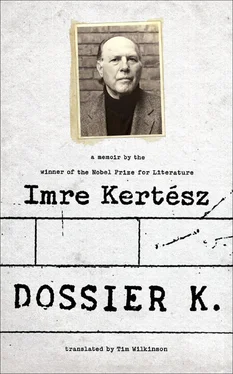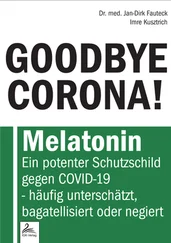Words that only gain their full import in their immanence — in the dramatic effect lent to them by place, moment, and the reader’s conspiratorial rapport. In a novel certain words can change their ordinary meaning; just as bricks are needed in the construction of a cathedral, but in the end what we marvel at is the steeples and the building that has taken shape through their agency.
So it wasn’t salvational zeal that took you into the Communist Party, then, or vengeance .
Much more simple decency, I would say.
Decency? I don’t follow .
You might do so better if I were to talk about the necessity of the sense of “belonging somewhere,” which people find so self-explanatory. I realized fairly quickly that this need had hoodwinked me and led me into a trap. I tried to believe in something that ran radically counter to my nature and lifestyle; in truth I did not have trouble so much with the object of my “belief”—with Marxism or my “salvational zeal,” as you put it — but with “belief” per se as a style — I don’t know how else to express it. Because it soon became clear that it was useless my trying to close my eyes and explain the world from the viewpoint of a theory of some kind: the truth kept on pushing itself forward and plunging me into unpleasant situations. To begin with I merely found myself at odds with my well-founded doubts, but after the so-called “year of decision” of 1948 the terror set in, and I was astounded to notice that I found myself irredeemably on the wrong side as a result of my own zeal.
Did the realization shock you? Did it change your life?
I don’t think so. It was more just a matter of me finding my proper place, if I may put it like that. It put me in touch again with the feeling in which I recognized my life, the feeling that in a certain sense guided me home, and that was a sense of life’s absurdity, the simple and inexorable truth of being able to do nothing and being defenceless. In a certain sense it was a completely satisfying feeling that was later to save me from further brooding and posing the wrong questions.
I’m trying to guess what is hidden behind those words. A sixteen-year-old boy who had been in Auschwitz and Buchenwald, goes back to school and prepares to take his school-leaving examinations. Who is still tortured by nightmares …
I wasn’t tortured by nightmares. Every now and again it would happen that I was woken by an anxiety that that I had missed Appell , the morning muster, but — how to put it? — my “internal clock,” that mysterious mental chronometer, was soon reset. I can see from your face that you weren’t expecting that. Would you have preferred to hear something a bit more morbid?
I don’t appreciate the black humour quite so much on this occasion. I hardly think you would be downplaying the seriousness of experiences you acquired in the death camps quite as much if you hadn’t written your works .
But that has given me the right to be totally frank. Look, the fact is that we are having this conversation now , and not in 1946 or ’47. That is to say, in the meantime I have written my books, and that has obviously altered my memories: they have acquired another character, I might say, maybe even faded, irrespective of the time that has passed. But the fact that I later became a writer in itself presupposes a singular nature. What I have in mind is that more than likely I stand in a different kind of metabolic relationship to reality than do others. What torments most people as an indigestible thought in my case proves all of a sudden to be the raw material for a novel, and as it gains shape I am rid of it. It’s not a conscious act, of course; in my younger days it must have been working quite instinctively inside me. As it is now, looking back on myself from sixty years later, what I see is a fundamentally cheerful young man, who is greedy for life and will not allow anyone or anything to put him off. Of course, he remembers everything that happened to him, but he fits that into the natural order of things. He doesn’t feel any self-pity; he doesn’t ask, like so many others, “why me of all people?”; if asked about his experiences he talks about them with complete detachment: it’s not that he brags about them, but he’s kind of proud of them, if you see what I mean. More than that, I’ll tell you something even more curious: he calls on their help for the remainder of his life.
Is that what you are referring to in Galley Boat-Log when you write that the Stalinist dictatorship saved you from feelings of major disappointment, indeed from suicide? 11
Yes, that’s probably so.
There is something that we have not yet clarified. Before you spoke about the sense of belonging, you said that you were carried into Communism by decency. What exactly do you mean?
That one had to take sides. As I mentioned, young people at the time were galvanized by heated debates. The country was in the grip of a great creative zest in the immediate post-war years; at the same time the prevailing conditions were very chaotic. In late 1945 the depreciation in what was then still the unit of Hungarian currency, the pengő, got underway, which over the next six months grew into what is still on record as the greatest hyperinflation in history. Pengő denominations became first “million pengő” then “billion pengő” denominations, with one billion pengős as the basic unit, and even that not for long. Shops would hourly alter the price tickets they displayed. In the spring of 1946, on the terraces of the Budapest cafés such as the “Jeep,” the “Liver Fat,” the “Moulin Rouge,” and the like, customers paid in broken gold for their coffees and whiskeys. The head-waiters carried around tiny scales in their pockets, which they would pull out when the bill was settled and hide away in terror when there was a “raid.” An Economic Police force was set up, which not infrequently found itself in pitched gun battles with smugglers and “black marketeers.” A person couldn’t live from regular wages: factories and offices — including the Budapest-Salgótarján Engineering Works, where my mother worked — paid wages in “kind,” giving employees potatoes or flour instead of money. Otherwise, an exultant sense of freedom reigned. A true democracy began to emerge in Hungary for the first time in the country’s history, and on the basis of the population’s free vote, what’s more. But look here! It’s not my job to dish out history lessons, but let me mention the alleged testament of the international jurist István Bibó that made the rounds many years later among Budapest intellectuals: “When I die,” he is supposed to have said or written, “carve on the headstone of my grave: ‘Here rests István Bibó, flourished 1945–1948.’” That says something about the age, wouldn’t you agree?
You observed all that from a school desk or the Liver Fat café?
That’s a good question. I didn’t spend the bulk of my time on the school bench, that’s for sure. How could I have? The cinemas were full of viewers for American films, old and new ones alike: Lewis Seiler’s Guadalcanal Diary; Billy Wilder’s Five Graves to Cairo with Erich von Stroheim; Michael Curtiz’s Casablanca . I devoured war films; I couldn’t get enough of the German defeat; it’s more than possible that I gave vent to my ressentiment toward the film screen. Yet I equally enjoyed films like Broadway Rhythm with George Gershwin’s magical soundtrack — to list them all I wouldn’t know where to start. Then again, not far from the school was Pollack’s Table Tennis and Billiard Room. We would meet up at eight o’clock in the morning at the school, but by nine or ten o’clock our gang would be either in a cinema or at the ping-pong table, or possibly in the steam bath at the Hungária Hotel. And it was at afternoon teas then that I suddenly discovered girls …
Читать дальше












